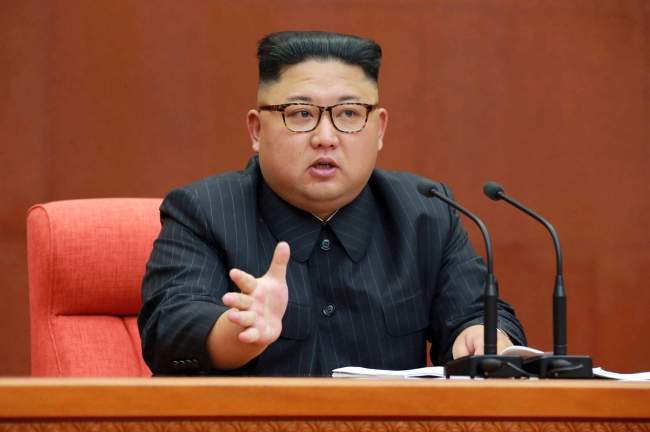North Korean leader Kim Jong-un is practical and likely to give up nuclear weapons programs, unlike his father, to break out of isolation and revive the country’s economy, North Korea experts said Thursday.
Kim has been depicted as a vicious, immature leader, but he is also practical and decisive, which offers a real opportunity to have North Korea abandon its nuclear arsenal for the right price, they say.
“He is a practical leader. He could take bold steps. Just look at his visit to China. He is more open to enduring embarrassment if things could work in his interest, and breaking old practices,” Lee Gee-dong, vice president at the Institute for National Security Strategy, told a forum in Seoul.
 |
| North Korean leader Kim Jong-un (AP) |
In 2013, Kim outlined a new policy: the “byeongjin line,” or parallel development, to combine nuclear armament and economic growth. After proclaiming itself as a nuclear weapons state last year, the remaining task appears to be boosting its economy.
Its faltering economy poses a bigger threat than anything else to Kim’s long-term rule. So this time, Kim feels the need to normalize relations with adversaries, expand its diplomatic engagement and improve the communist state’s faltering economy — key to its regime survival internally.
“Now, North Korea seeks to become a normal state — controllable market economy and amicable diplomatic relations with other countries. This year, Kim began his journey to make the vision a reality,” he said.
And Kim cares about what others think of him and his country, he said, citing the renovation of the Pyongyang International Airport carried out as his first major project after taking power.
“Kim, who lived in Europe in childhood, might have been frustrated and even embarrassed about the poor state of the Pyongyang Airport, a gateway to his country,” he said. “That explains Kim Jong-un’s unique view, seeking to build a powerful, civilized and socialist nation.”
The North Korea expert also noted that Kim has decisive leadership, citing a suspected assassination of Kim Jong-nam — his half-brother and the eldest son of his father Kim Jong-il — in broad daylight in Malaysia in 2017.
This year, Kim has been on the diplomatic offensive, offering to hold talks with South Korean President Moon Jae-in and the US President Donald Trump. The young leader made his debut in international diplomacy by meeting Chinese President Xi Jinping in Beijing. It was his first known trip abroad as a leader since taking power in 2011.
It is a remarkable shift following a year of mounting tensions, accentuated by North Korea’s nuclear and missile tests last year.
What sets him apart from his father Kim Jong-il is his confidence stemming from possession of nuclear weapons. Kim is ready to negotiate over nuclear weapons to gain more concessions from the US and South Korea, said Cheong Seong-chang, a senior research fellow at the Sejong Institute.
“Kim is in a situation where he has to choose either of these two: perfecting its nuclear and missile capability at the expense of the economy, or putting its nuclear weapons up for negotiations to win a normalization of relations with the US, a peace treaty on the Korean Peninsula and economic revival,” he said.
“North Korea began developing nuclear weapons out of security concerns. When those concerns are addressed, I think North Korea can give up its nuclear arsenal,” he said. “The very reason Kim offered to hold talks with Moon and Trump signals a change in his attitude.”
Cheong pointed out that Kim is relying less on a reign of terror, compared to his father and grandfather.
“He is relying more on a system,” he said, citing that Kim briefed top ruling party officials at a meeting of Politburo of the ruling party’s Central Committee on Monday. His father rarely convened the meeting, he added.
The purges of seven North Korea officials, who escorted his father’s funeral car in 2011, were not to consolidate his power or instill fear, he argued. The purges have been largely seen as a symbol of a reign of terror by Kim.
As one example, he said that Ri Yong-ho, Chief of the General Staff of the Korean People’s Army, had been executed in July 2012, not because Kim wanted to solidify his power but because Ri opposed Kim’s move to take control of the North’s foreign labor project away from the military.
Some 140 officials have been executed since Kim took power in 2011, according to a 2016 report by the Institute for National Security Strategy under the National Intelligence Service. His father Kim Jong-il executed an estimated 2,000 officials between 1997 and 1999.
Kim and his younger sister Kim Yo-jong, who spent their childhood abroad, as well as Kim’s diplomacy team filled with those who are familiar with the outside world, could be an opportunity to lead the reclusive country to join the international community, he said.
“I think Kim could become a leader who could drive reforms and opening of the country just like Deng Xiaoping of China, if South Korea and the international community actively responds to Kim’s determination to give up its nuclear programs,” he said.
By Ock Hyun-ju (laeticia.ock@heraldcorp.com)

